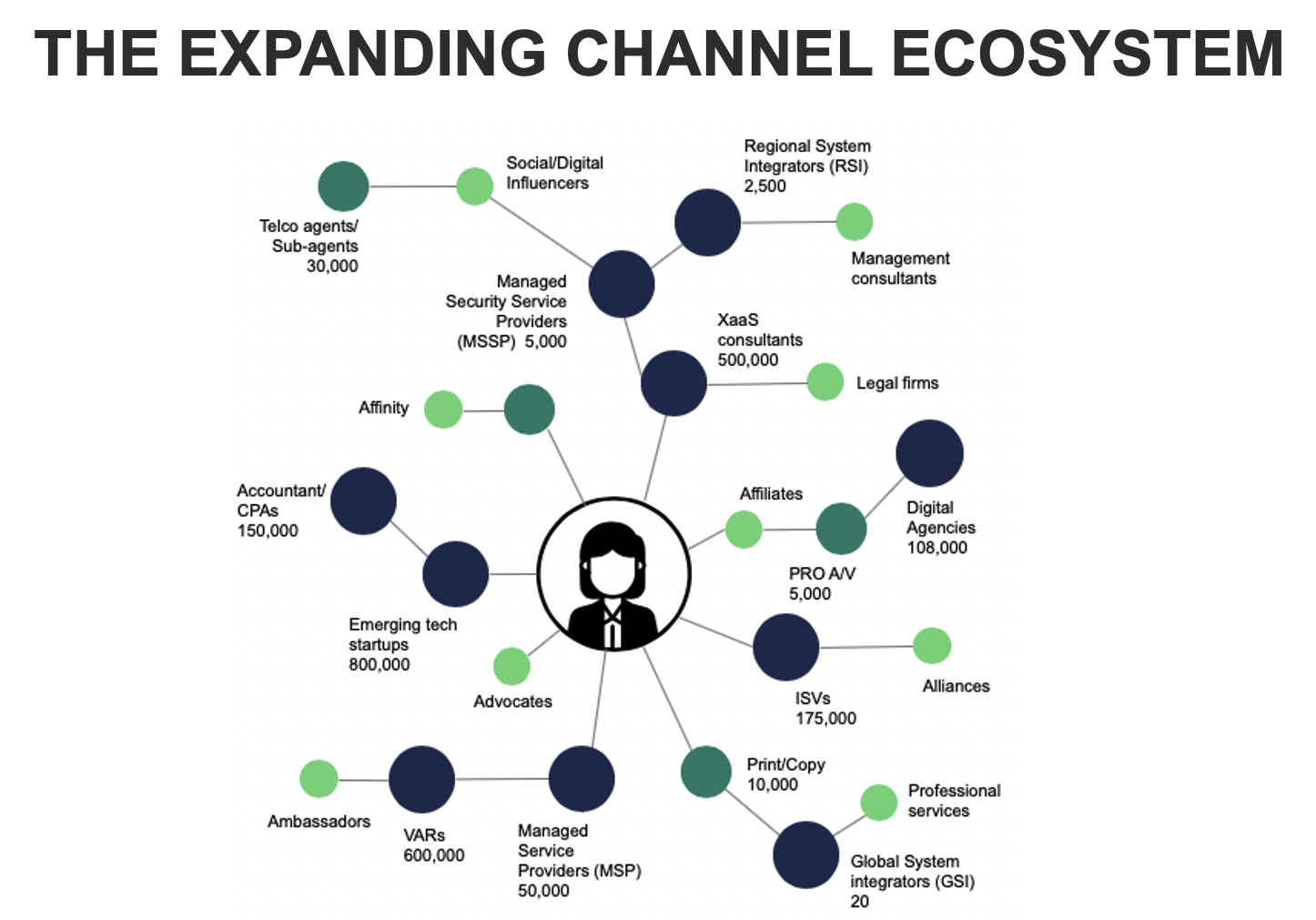A Partner Ecosystem Digital Marketing Manager strategizes and implements marketing campaigns with business allies. They optimize joint efforts to maximize the ecosystem’s performance and growth
The role of a Partner Ecosystem Digital Marketing Manager is pivotal in creating symbiotic relationships between a company and its partners. Through the development and management of collaborative marketing strategies, these managers drive brand awareness and revenue growth for all parties within the partnership network.
Their work involves coordinating with multiple stakeholders, understanding partner needs, and leveraging shared resources to execute campaigns that benefit the entire ecosystem. They utilize data-driven insights to inform decisions, ensuring that each marketing initiative is targeted and effective. Effective communication skills, along with a deep understanding of digital marketing channels and analytics, are crucial for success in this role. These managers are the architects of a dynamic marketing landscape where the combined efforts of various organizations lead to mutual success.

Credit: www.kiflo.com
The Evolving Role Of Digital Marketing Managers
Digital marketing managers are steering the ship in the stormy seas of the internet. They make sure customers and companies stay connected. Today’s digital world is ever-changing. Good digital marketing managers have to stay sharp and adapt quickly.
Shaping Partnership Strategies
The best partnerships make businesses shine brighter. A partner ecosystem digital marketing manager crafts these alliances. They find friends in the digital playground. These friends help a business grow.
- Identifying opportunities where brands can support each other.
- Creating win-win scenarios for all parties involved.
- Mapping out joint campaigns that align with mutual goals.
Integrating Digital Ecosystems
These managers are like digital architects. They build bridges between software, platforms, and services. Integration makes everything work together smoothly.
| Task | Goal |
|---|---|
| Combine tools | Boost efficiency |
| Share data | Enhance customer understanding |
| Automate processes | Save time and money |
Core Responsibilities Of Ecosystem Marketing Managers
Ecosystem Marketing Managers play a pivotal role in the growth of a company. These professionals shape partnerships and drive the success of collaborative efforts. Their tasks vary and cover strategic, analytical, and relationship-building domains.
Building And Nurturing Relationships
Creating and maintaining strong bonds is at the heart of a partner ecosystem role. Ecosystem Marketing Managers craft a network of allies, advocate for shared goals, and enrich cooperation.
- Identify potential partners relevant to the business
- Develop partnership strategies that benefit all involved
- Organize networking events to foster community
- Maintain regular communication to ensure alignment
- Provide resources and support to help partners succeed
Mastering Cross-channel Marketing
In today’s digital world, mastery over varied communication channels is crucial. Ecosystem Marketing Managers optimize efforts across platforms for the highest impact.
| Channel Type | Objective |
|---|---|
| Email Marketing | Personalized outreach and follow-up |
| Social Media | Brand awareness and community engagement |
| Webinars & Events | Education and networking opportunities |
| Content Marketing | Value-driven storytelling and thought leadership |
Strategic Alignment With Partners
In the dynamic world of digital marketing, Partner Ecosystem Digital Marketing Managers play a pivotal role. They bridge the gap between companies and their partners to create a unified market approach. Let’s delve into the subtleties of Strategic Alignment with Partners, highlighting how these managers foster synergy for unparalleled market impact.
Tailoring Joint Go-to-market Plans
Crafting a joint go-to-market plan is crucial for partnered success. It begins with identifying mutual goals and aligning marketing strategies. Tables often illustrate how each partner can contribute unique strengths:
| Partner Contribution | Strategy | Expected Outcome |
|---|---|---|
| Technology Tools | Integration Leverage | Enhanced Product Offering |
| Brand Recognition | Co-branding Initiatives | Increased Market Reach |
Once established, clear metrics ensure each milestone steps toward collective objectives.
- Quarterly reviews adjust tactics.
- Customer feedback guides refinement.
- Revenue tracking gauges success.
Synchronizing Brand Messages
Consistency is key to building trust. Digital Marketing Managers align partner brand messages to resonate with the target audience. This includes:
- Aligning brand values and narratives.
- Coordinating content creation to unify messaging.
- Sharing brand guidelines for cohesive visuals.
Through meticulous planning, partners amplify each other’s market presence. Regular communication channels maintain this alignment:
- Partner portals offer centralized resources.
- Monthly calls keep everyone on the same page.
- Email updates share the latest news and changes.
Optimizing The Partner Journey
Imagine a path lined with stepping stones that help partners navigate with ease. ‘Optimizing the Partner Journey’ is about smoothing that path. It’s a journey towards fruitful collaboration. With each step crafted just right, partners will walk this path smoothly. A Digital Marketing Manager’s goal lies in refining each stone. This journey leads to a destination of mutual growth and success. Let’s uncover the steps.
Leveraging Data Analytics
Data holds the key to understanding partners. It sheds light on patterns and behaviors. With data analytics, a Marketing Manager transforms raw data into insights. These insights craft targeted strategies. They pave the way for partners to connect with resources they need. Analytics tools measure success at each journey stage.
Key performance indicators act as signposts. They guide adjustments for peak effectiveness. Visual dashboards display these metrics. They include:
- Conversion Rates
- Engagement Levels
- Partner Satisfaction Scores
Managers track and tweak the journey. They ensure every partner finds value at their pace.
Enhancing The Partner Experience
Happy partners are the best advocates for your ecosystem. Enhancing the experience they encounter is crucial. Experiences begin with first impressions. They extend to ongoing support and beyond. It’s all about providing a seamless interface. Platforms should be intuitive and resources, easy to find.
Strategies include:
- Regular communication
- Customized content
- Training modules
Feedback loops tight, Digital Marketing Managers listen to partners. This listening helps refine the journey further. Partners thrive. The ecosystem flourishes.
Collaborative Tools And Technologies
In the world of digital marketing, success hinges on strong partnerships. A Partner Ecosystem Digital Marketing Manager knows the power of teamwork. We now explore the bread and butter of collaboration: tools and technologies!
Utilizing Crm And Prm Solutions
Customer Relationship Management (CRM) systems are digital rolodexes. They keep track of every interaction with partners and customers. With a CRM, you can see who needs attention at a glance. Let’s not forget about Partner Relationship Management (PRM) solutions. PRMs help manage and grow partner relationships.
- Track partner performance: Monitor sales and marketing activities.
- Access control: Decide who sees what information.
- Onboarding tools: Make new partner setup easy.
CRM and PRM tools together are like a superpower for partnership management. They keep everyone on the same page no matter where they are.
Adopting Marketing Automation Platforms
Time is precious in digital marketing. Here is where Marketing Automation Platforms (MAPs) shine. They handle repetitive tasks so you don’t have to.
| Task | How MAP Helps |
|---|---|
| Email campaigns | Sends emails on time, every time |
| Social media posting | Posts updates without manual input |
| Lead scoring | Identifies hot leads quickly |
Automation means personalized experiences at scale. Engage partners and clients without missing a beat. In fact, automation is like having an army of diligent helpers. They work 24/7 and never ask for a coffee break.

Credit: www.forrester.com
Developing Digital Content For Partners
As a Partner Ecosystem Digital Marketing Manager, creating digital content that resonates with your partners is vital. Tailoring content to support your partners strengthens relationships and amplifies your reach. Your goal should be to provide partners with valuable resources. These resources help them market your products effectively. Delve into creating engaging portals and crafting joint campaigns. Both enhance the partner experience with your brand.
Creating Engaging Partner Portals
Partner portals are digital homes for collaboration. They make information sharing easy and effective. A well-crafted portal offers:
- All the needed sales tools,
- Marketing materials,
- And training resources in one place.
The content must be:
- User-friendly,
- Current, and
- Aligned with your brand’s image.
Ensure to include:
- Interactive elements
- To facilitate learning and engagement.
- Search capabilities,
- So partners find what they need quickly.
Crafting Co-branded Campaigns
Co-branded campaigns unite your brand with your partners. These campaigns leverage shared values. They also target shared audiences for maximum impact. For effective campaigns:
| Strategy | Action |
|---|---|
| Analyze the audience | Determine mutual target customers. |
| Define goals | Set clear, measurable objectives. |
| Choose platforms | Decide where to promote your campaign. |
Create content that:
- Reflects both brands’ strengths,
- Offers value to your audience,
- And drives engagement.
Track the performance with analytics. Use this data to refine future campaigns.
Measuring Success In Partner Marketing
Understanding the effectiveness of partner marketing efforts is crucial. A Partner Ecosystem Digital Marketing Manager must gauge progress accurately. This ensures that both investments and strategies align with business goals. Let’s dive deeper into how success gets measured in this dynamic space. London Digital Marketing Crouch End
Tracking Kpis And Roi
Key performance indicators (KPIs) are the lifeline of assessing partner marketing success. It’s important to identify and monitor relevant KPIs closely. Common KPIs may include:
- Lead Generation: Number of leads coming from partners.
- Sales Conversion: How many leads turn into sales.
- Partner Engagement: Frequency and depth of partner interaction.
Return on investment (ROI) is the ultimate measure of profitability. It compares the gains against the cost. Effective tracking of ROI from partnership activities can outline the economic benefits derived from these collaborations.
Here’s a simple table for tracking main KPIs:
| KPI | Target | Actual | Deviation |
|---|---|---|---|
| Lead Generation | 1000/month | 850/month | -150 |
| Sales Conversion | 10% | 8% | -2% |
| Partner Engagement | Daily | Weekly | – |
Refining Strategies Based On Analysis
Data speaks volumes when it comes to refining marketing strategies. Analysis should drive decision-making. Here are steps to refine partnership strategies effectively:
- Review KPIs regularly.
- Identify areas that underperform.
- Adjust campaign tactics accordingly.
An agile approach to strategy refinement can make all the difference. It ensures that marketing efforts are not just a shot in the dark but are data-informed and targeted for best outcomes.
Future Trends In Partner Ecosystem Marketing
Future Trends in Partner Ecosystem Marketing are shaping the way businesses collaborate and succeed. In this fast-paced digital age, strategic alliances must stay ahead of the curve. Companies need digital marketing strategies that harness the full power of technological advancements. Let’s explore key trends that are setting the stage for a transformative future in partner ecosystem marketing.
Embracing Ai And Machine Learning
Artificial Intelligence (AI) and Machine Learning (ML) are revolutionizing partner ecosystem marketing. Marketers can now:
- Personalize interactions at scale.
- Automate routine tasks for efficiency.
- Analyze big data for deep insights.
- Improve user experience with chatbots and virtual assistants.
These tools help create more impactful campaigns that are tailored to partner needs.
Predictive Modeling For Partner Engagement
Predictive modeling uses data to forecast partner behavior. This involves:
- Identifying patterns in partner interactions.
- Anticipating needs to engage effectively.
- Optimizing resource allocation for best outcomes.
By predicting partner actions, businesses can craft focused strategies. They can also deliver value ahead of time, building stronger relationships.

Frequently Asked Questions On Partner Ecosystem Digital Marketing Manager
What Is Partner Ecosystem Marketing?
Partner ecosystem marketing is a collaborative strategy wherein businesses promote each other’s products or services to expand market reach and drive mutual growth.
What Does A Partner Marketing Manager Do?
A partner marketing manager develops and maintains relationships with business partners to co-create marketing strategies and campaigns that drive mutual growth and success. They negotiate partnerships, coordinate co-marketing activities, and track the performance of these collaborations.
What Is The Ecosystem Of Digital Marketing?
The digital marketing ecosystem encompasses various channels and strategies including SEO, social media, email marketing, content creation, and analytics for targeted online audience engagement.
Why Do You Need A Partner Ecosystem?
A partner ecosystem expands market reach, enhances product offerings, and fosters innovation through collaborative expertise and resources. It drives business growth and customer satisfaction by leveraging synergistic partnerships.
Conclusion
Navigating the partner ecosystem is a vital role in our interconnected market. A Digital Marketing Manager with this focus can propel brands to new success through collaboration and innovation. Embrace these strategies for a robust online presence that engages partners and customers alike.
Let’s leverage partnerships for outstanding outcomes.








